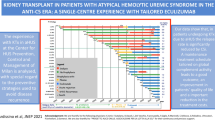Abstract
Purpose
Hemolytic–uremic syndrome (HUS) is a rare side effect of gemcitabine, which is reported as having a high morbidity and mortality despite interventions with standard HUS therapies including plasmapheresis. The purpose of this report was to describe the successful treatment of gemcitabine-induced HUS (G-HUS) with rituximab. It also aims to summarize the literature regarding the morbidity and mortality of G-HUS in pancreatic adenocarcinoma depending on the treatment given, ultimately providing some guidance for beneficial therapies.
Methods
This is a retrospective report of three patients with pancreatic adenocarcinoma who developed G-HUS and were treated with a combination of therapies including rituximab.
Results
All three patients received a combination of therapies to treat their HUS. One patient appeared to have some benefit with plasmapheresis. Resolution occurred following one course of rituximab for all three patients. This resolution has been long lasting with a minimum of eighteen month's follow-up. Similarly, in our literature review a variety of therapies were utilized, but immune therapies appear to reverse HUS if other therapies are failing.
Conclusion
Rituximab can be an effective therapy for reversal of hemolysis and stabilization of renal function in G-HUS when other therapies fail.


Similar content being viewed by others
References
Fung MC, Storniolo AM, Nguyen B et al (1999) A review of hemolytic uremic syndrome in patients treated with gemcitabine therapy. Cancer 85:2023–2032
Zupancic M, Shah PC, Shah-Khan F et al (2007) Gemcitabine-associated thrombotic thrombocytopenic purpura. Lancet Oncol 8:634–641
Boeck S, Geiger S, Schulz C et al (2008) Hemolytic-uremic syndrome associated with gemcitabine treatment for metastatic pancreatic cancer. J Clin Gastroenterol 42:551–552
Glezerman I, Kris MG, Miller V et al (2009) Gemcitabine nephrotoxicity and hemolytic uremic syndrome: report of 29 cases from a single institution. Clin Nephrol 71:130–139
Lee HW, Chung MJ, Kang H et al (2014) Gemcitabine-induced hemolytic uremic syndrome in pancreatic cancer: a case report and review of the literature. Gut Liver 8:109–112
De Smet D, Jochmans K, Neyns B (2008) Development of thrombotic thrombocytopenic purpura after a single dose of gemcitabine. Ann Hematol 87:495–496
Ruiz I, Del Valle J, Gomez A (2004) Gemcitabine and hemolytic-uremic syndrome. Ann Oncol 15:1575–1576
Leal F, Macedo LT, Carvalheira JBC (2014) Gemcitabine-related thrombotic microangiopathy: a single-centre retrospective series. J Chemother 26:169–172
Gore EM, Jones BS, Marques MB (2009) Is therapeutic plasma exchanged induced for patients with Gemcitabine-induced Hemolytic Uremic Syndrome? J Clin Apher 24:209–214
Ustwani OA, Lohr J, Dy G et al (2014) Eculizumab therapy for gemcitabine induced hemolytic uremic syndrome: case series and concise review. J Gastrointest Oncol 5:E30–E33
Bharthuar A, Egloff L, Becker J et al (2009) Rituximab-based therapy for gemcitabine-induced hemolytic uremic syndrome in a patient with metastatic pancreatic adenocarcinoma: a case report. Cancer Chemother Pharmacol 64:177–181
Gourley BL, Mesa H, Gupta P (2010) Rapid and complete resolution of chemotherapy-induced thrombotic thrombocytopenic purpure/hemolytic uremic syndrome (TTP/HUS) with rituximab. Cancer Chemother Pharmacol 65:1001–1004
Humphreys BD, Sharman JP, Henderson JM et al (2004) Gemcitabine-associated thrombotic microangiopathy. Cancer 100:2664–2670
Lewen SN, Mutch DG, Whitcomb BP, Liapis H, Herzog TJ (2005) Three cases of hemolytic uremic syndrome in ovarian cancer patients treated with combination gemcitabine and pegylated liposomal doxorubicin. Gynaecol Oncol 97:228–233
Casper ES, Green MR, Kelsen DP et al (1994) Phase II trial of gemcitabine (2,2′-difluorodeoxycytidine) in patients with adenocarcinoma of the pancreas. Invest New Drugs 12:29–34
Choi M, Woywodt A, Gobel U et al (1999) Hemolytic uremic syndrome after gemcitabine treatment for pancreatic carcinoma. Nephrol Dial Transplant 14:2523–2524
Flombaum CD, Mouradian JA, Casper ES et al (1999) Thrombotic microangiopathy as a complication of long-term therapy with gemcitabine. Am J Kidney Dis 33:555–562
Lhotta K, Kuhr T, Rumpelt HJ et al (1999) Thrombotic microangiopathy with renal failure in two patients undergoing gemcitabine chemotherapy. Am J Nephrol 19:590–593
Maginnis P, Anderton J, Nair B et al (2011) tHe USual suspects. NDT Plus 4:260–263
Phelan PJ, Liew A, Magee C (2009) A case of progressive hypertension preceding gemcitabine-associated thrombotic microangiopathy complicated by acute kidney injury and stroke. Ren Fail 31:743–744
Richmond J, Gilbar P, Abro E (2013) Gemcitabine-induced thrombotic microangiopathy. Internal Med J 43:1240–1242
Saif MW, McGee PJ (2005) Hemolytic-uremic syndrome associated with gemcitabine: a case report and review of literature. J Pancreas 6(4):369–374
Wato M, Inaba T, Ishikawa H et al (2010) A case of hemolytic uremic syndrome after adjuvant chemotherapy with gemcitabine in a patient with pancreatic cancer. Nippon Shokakibyo Gakkai Zasshi Jap J Gastroenterol 107:1676–1685
Zemtsov A, Omueti-Ayoade K, Zemtsov R, Yang M (2012) Livedo reticularis as an initial clinical manifestation of gemcitabine-induced hemolytic uremic syndrome. J Dermatol 39:487–489
Muller S, Schutt P, Bojko P et al (2005) Hemolytic uremic syndrome following prolonged gemcitabine therapy: report of four cases from a single institution. Ann Hematol 84:110–114
Walter RB, Joeger M, Pestalozzi BC (2002) Gemcitabine-associated hemolytic-uremic syndrome. Am J Kidney Dis 40:E16
Synder HW, Mittelman A, Oral A et al (1993) Treatment of cancer chemotherapy-associated thrombotic thrombocytopenic purpura/hemolytic uremic syndrome by protein A immunoadsorption of plasma. Cancer 71:1882–1892
Taylor RP, Lindorfer MA (2007) Drug insight: the mechanism of action of rituximab in autoimmune disease—the immune complex decoy hypothesis. Nature Clin Practice Rheumatol 3:86–95
Garvey B (2008) Rituximab in the treatment of autoimmune haematological disorders. Br J Haematol 141:149–169
Oettle H, Post S, Neuhaus P et al (2007) Adjuvant chemotherapy with gemcitabine vs observation in patients undergoing curative-intent resection of pancreatic cancer: a randomized controlled trial. JAMA 297:267–277
Acknowledgments
Roche and Prince of Wales Hospital compassionately funded the rituximab doses for these patients.
Author information
Authors and Affiliations
Corresponding author
Ethics declarations
Conflict of interest
David Goldstein has been an unremunerated advisor to Lilly, Celgene and Roche.
Rights and permissions
About this article
Cite this article
Ritchie, G.E., Fernando, M. & Goldstein, D. Rituximab to treat gemcitabine-induced hemolytic–uremic syndrome (HUS) in pancreatic adenocarcinoma: a case series and literature review. Cancer Chemother Pharmacol 79, 1–7 (2017). https://doi.org/10.1007/s00280-016-3123-6
Received:
Accepted:
Published:
Issue Date:
DOI: https://doi.org/10.1007/s00280-016-3123-6




